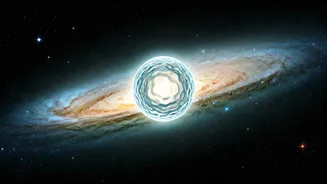Temperature Measurement's Impact
A team from Keio University has successfully measured the ancient cosmic temperature, offering significant support for the Big Bang theory. The measurement,
a crucial test of the theory, confirms that the early universe was exceptionally hot. This finding directly corroborates theoretical predictions made long ago, strengthening the scientific consensus on how the universe originated. This validation is a notable step in solidifying our comprehension of the universe's development and the conditions present shortly after its genesis. The precise measurement aligns with projections based on the Big Bang theory, offering solid proof. By analyzing the faint afterglow of the Big Bang, scientists can glean valuable insights into the fundamental features of the universe. This recent research shows the significance of rigorous observation and confirmation to understand the vast cosmos.
Big Bang Prediction Verified
The research by the Keio University team offers robust evidence that the Big Bang theory's core predictions are accurate. Their measurement of the early universe's temperature closely mirrors the values projected by the theory. Such concordance is crucial because it indicates that the core concepts behind the Big Bang correctly characterize the initial conditions and subsequent evolution of the cosmos. This level of confirmation is vital for scientists, as it validates the theoretical framework and encourages future research. It also offers assurance that the scientific community is building on a reliable foundation when exploring the universe. Confirming the temperature is also essential because it helps to model the behavior of the universe. The team's achievement emphasizes the power of scientific observation in validating theoretical models. This research also suggests that existing models accurately depict conditions in the early universe, allowing scientists to have confidence in using these models to project the universe’s future.
Cosmic Microwave Background Study
The researchers employed sophisticated methods to study the Cosmic Microwave Background (CMB), the residual radiation from the Big Bang. The CMB acts as a snapshot of the early universe, providing valuable data regarding its condition shortly after its origin. The meticulous study of the CMB allowed the scientists to ascertain the temperature that existed billions of years ago. The CMB's properties, including its temperature, are keys to understanding the universe's composition and evolution. These findings also strengthen the understanding of how the universe expanded and cooled. By analyzing its characteristics, scientists can extrapolate to the present conditions, as well as the predicted future of the cosmos. The research reinforces the idea of a universe born from extreme heat and that continues to cool as it grows. The CMB is still a prime target for space telescopes and observatories around the globe, and continuing to understand it further will help us know more about the formation of the universe.
Implications and Future Research
The confirmation of the ancient cosmic temperature has profound implications for cosmology and the exploration of the universe's past. This success encourages future studies focused on the CMB and the early universe. Scientists can refine existing models, improve simulations, and investigate outstanding mysteries. This discovery offers new angles for probing the fundamental properties of dark matter and dark energy, which are believed to play a critical role in the universe's overall development. Further investigations of the CMB could potentially expose new physics or enhance current models. The success of Keio University’s team highlights the importance of international scientific collaboration and resource allocation for long-term projects. As space-based and ground-based observatories improve, further breakthroughs in understanding the universe’s age, composition, and fate are increasingly likely.












